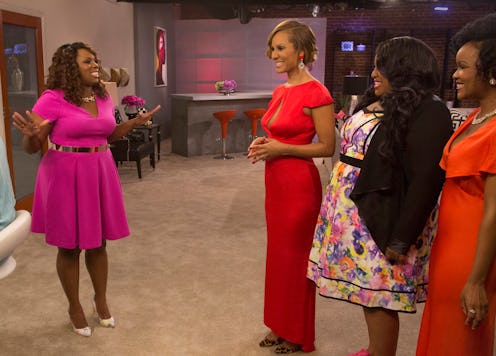Entertainment
Does Lifetime Have Another Offensive Show?

Ahead of its Aug. 27 premiere date, Lifetime's Girlfriend Intervention received criticism from critics who think the show is offensive and will only perpetuate stereotypes about black women. One of the series' stars, Tiffiny Dixon, addresses the criticism in a conference call with costar Tanisha Thomas and reporters by saying, "I think the fact that they're criticizing it shows more racism on their side than our side, because a lot of the criticism came out before they saw us, before they heard us speak, before they had any sort of idea about what the show is really about."
The show follows a group of four African-American women, each with their own area of expertise, that includes Nikki Chu (home), Tanisha (soul), Tiffiny (style), and Tracy Balan (beauty) as they help white women find their inner "strong black woman ready to bust out," as the show's intro explains.
Some have argued the show is perpetuating the stereotype of an "strong black woman," one who is always outspoken, upbeat, or infallible, which doesn't reflect how people actually think and feel. Others have said that Girlfriend Intervention uses the trope of an African-American individual magically entering the life of a white protagonist to save him or her.
I've seen two episodes of the series, including the premiere episode, and so far, Girlfriend Intervention does seem to play off of stereotypes of all kinds, and not just those of African-American women. The premiere episode focuses on Emily, a young mom whose beauty regimen has taken the backseat to taking care of her family. A later episode this season will follow Sam, a nerdy 30-something that likes Harry Potter and cosplay and doesn't know how to dress well. Both of these are stereotypes we've heard time and time again.
Sure, the gurus on Girlfriend Intervention are loud, flamboyant, and sassy, but if they weren't, they probably wouldn't be on reality TV in the first place. Those who appear on reality TV usually play a role that represents a cliche persona or is a caricature of who they are in real life, like the Jersey Shore cast's representation of Italian-Americans or how Kristin Cavallari admitted that much of what made her The Hills' resident "villain" was faked for the cameras. I'm not saying Girlfriend Intervention's use of stereotypes is OK. It is offensive, but it's just no different than what we see in most reality shows, not to mention throughout most of pop culture. If you're looking for cultural sensitivity, you're in the wrong genre to begin with.
Still, there is something to be said about women sharing their different cultural experiences with one another. "I think that bringing the races together is kind of the antithesis to the problem we're having now with racism. Finally, we're coming together, we're embracing the fact that, you know what, I'm proud of my race, my culture. You're proud of your culture," Tiffiny says. "Let's come together and merge and learn from each other."
And it's true that people from any background can benefit from the core values of the show: wanting to better yourself and strengthen your self-confidence. "Our message applies to every single woman out there. Yes, we made over Caucasian women the first season, but that can all change the second season," Tanisha says. "The message is really universal. It's about women empowerment, women everywhere, all colors of all shapes and sizes."
Images: Richard Knapp/Lifetime (2)